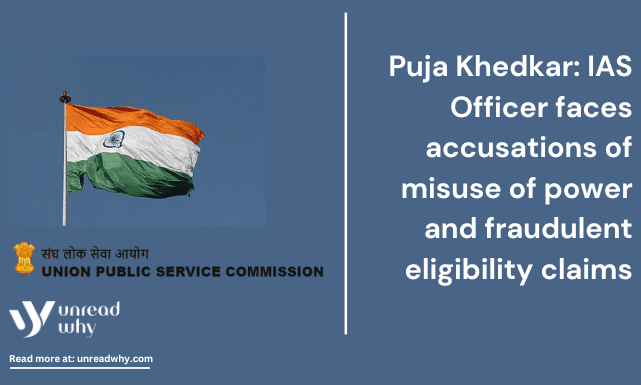Pune, India – IAS Officer Puja Khedkar has become a face of controversy, as she made negative comments following her recent transfer from the city of Pune to Washim. The probationary officer is facing serious allegations, and she is allegedly being questioned about misusing her authority as a civil servant and demanding undue privileges. She is also facing criticism for claims regarding her eligibility for her position.
Misuse of authority
Puja Khedkar, a 2023-batch Indian Administrative Service officer. She was appointed as an assistant collector in Pune city, but now she attracted attention for reportedly demanding special privileges typically afforded to probationary officers. Her demands include a private office, luxury car, house and staff who would work under her before even taking charge.
Puja Khedkar’s WhatsApp conversation is exposed, where she was found insisting on these arrangements being made prior to her joining date. Therefore, her continuous pressure for these demands raised concerns among senior officials about her suitability for the position as a civil servant.
Khedkar was reportedly using the Maharashtra Government board on her private Audi car and a red-blue beacon. Such privileges leveraged by her own will fuel the controversy being in the probationary period. Seeing her putting constant pressure on senior officials, Suhas Diwase, the Pune District Collector, reported these issues to the Chief Secretary in Pune. These actions led to her transfer to Washim, where she will serve as a supernumerary assistant collector.
Fraudulent eligibility claims against Puja Khedkar
Puja Khedkar’s entry into the Indian Administrative Services is under probation because of alleged fraudulent claims. It is found that she carries fake disability documents of being visually impaired as well as Other Backward Class (OBC), which secured her position. Although she claimed mental illness and low vision quality under the PwD quota, Khedkar refused six medical verification requests for her verification at AIIMS. Instead, she provided an MRI certificate, which was collected from a local private facility. To everyone’s surprise, it was accepted. This raised questions about the authenticity of her claims.
Because of her controversy, her allegations are taken seriously by authoritative bodies, and investigations expose discrepancies in her OBC non-creamy layer status. In this overall dilemma, Puja Khedkar, with her father’s affidavit, was stubborn in her demands, and it indicated significant wealth, which would disqualify her from such reservations. Based on these findings, it prompted further inquiries into her credibility to seat for the Union Public Service Commission (UPSC) examination.
Family background
Dilip Khedkar, the father of Puja Khedkar was a state government officer in the state of Maharashtra. Several reports indicate that he exerted pressure on the office of the District Collector to fulfil his daughter’s demands. As a result, it led to the complications of posting Puja Khedkar to Washim, Maharashtra.
Public and Administrative Responses
There seem to be no doubts about Puja Khedkar’s allegations, as they sparked significant public as well as administrative interest. The case highlights concern about the integrity of civil servants. It also underscores the need for strict verification initiatives by the board members during the overall process. The broader implications of her actions, along with the allegations against her, remain under active investigation.
UPSC – an undemanding comparison with other government examinations
2024: The year has been challenging for other candidates, in the area of medical science to teaching, where NEET aspirants are still going through scrutiny for paper leaks, heightened grace marks and high cut-off. UGC NET applicants have also witnessed the same because of paper leaks and wrong exam conduction.
The comparison lies in the code of conducting such reputed examinations, affecting aspirants’ state of mind. It won’t be wrong to say that as the case of Puja Khedkar unfolds, it serves as a reminder for the government examination agencies, including UPSC and the National Testing Agency (NTA), to be aware of the significance of ethical conduct.


